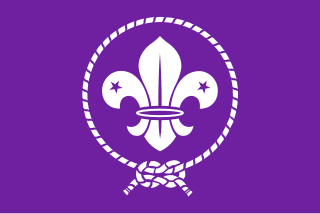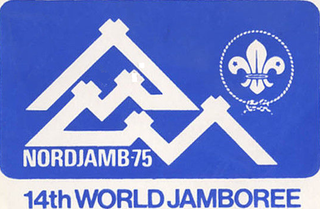
The European Scout Region is one of five geographical subdivisions of the World Organization of the Scout Movement, headquartered in Geneva, Switzerland, with a satellite office in Brussels, Belgium.

The Associação de Escoteiros de Macau is the national Scouting association in Macau, China. It is an Associate Member of the Asia-Pacific Region of the World Organization of the Scout Movement, and became a Full Member of WOSM on 16 August 2017 during the 2017 World Scout Conference.

The União Nacional dos Escuteiros de Timor-Leste is the national Scouting organization of East Timor. It was founded on December 2, 2005 through the merger of the Corpo de Escuteiros Católicos em Timor-Leste and of Timor-Leste Scouting. The organization is a member of the Comunidade do Escutismo Lusófono. It became a member of the World Organization of the Scout Movement on 22 June 2017.

The União dos Escoteiros do Brasil is the national Scouting organization of Brazil. Scouting in Brazil was founded in 1910 and was among the charter members of the World Organization of the Scout Movement in 1922. The União dos Escoteiros do Brasil itself was founded in 1924; it has 62,990 members as of 2021. The association is a member of the Comunidade do Escutismo Lusófono.
The Federação Escotista de Portugal is the national Scouting federation of Portugal. Scouting in Portugal started in 1911 and was among the founders of the World Organization of the Scout Movement in 1922. The present federation was founded in 1928. It serves 77,352 members of both sexes.

The Associação de Escuteiros de Angola, the national Scouting organization of Angola, was founded in 1994 and became a member of the World Organization of the Scout Movement on June 13, 1998, and was officially welcomed into WOSM at the World Scout Conference in South Africa in July 1999. The association is a member of the Comunidade do Escutismo Lusófono.

The Associação dos Escuteiros de Cabo Verde, the national Scouting organization of Cape Verde, was founded in 1990, and became a member of the World Organization of the Scout Movement in 2002. The Associação dos Escuteiros de Cabo Verde has 372 members as of 2021.

The Liga dos Escuteiros de Moçambique (LEMO), the national Scouting organization of Mozambique, was founded in 1994, and became a member of the World Organization of the Scout Movement in 1999. The coeducational Liga dos Escuteiros de Moçambique has 31,108 members as of 2017, with most members located in the major cities. The National Chief Scout Leonardo Adamowicz is from Poland, hence the Liga dos Escuteiros de Moçambique uniform is similar to the Polish uniform, adopted to climate differences. The similarities between the Mozambican Scout emblem and the Polish Scout lilijka may readily be noted, as well. The "D H P" in the emblem stands for Deus Honra Pátria, God Honor Country.

The Corpo Nacional de Escutas da Guiné-Bissau was the national Catholic Scouting organization of Guinea-Bissau.

Manuel Vieira de Matos was Bishop of Guarda, Archbishop of Braga, and the founder of the Corpo Nacional de Escutas - Escutismo Católico Português.

The Corpo Nacional de Escutas – Escutismo Católico Português is the largest Portuguese Scouting organization. The association was founded in 1923 and became a member of the World Organization of the Scout Movement in 1929; at present, this membership is maintained via the Federação Escotista de Portugal. The association serves about 80,000 members of both genders.

The Associação dos Escoteiros de Portugal is a youth organization concerned with education and the development of civil character. It was the first Scouting organization in Portugal, being established in 1913, and was a founding member of the World Organization of the Scout Movement (WOSM). Unlike most Scouting groups in Portugal, the AEP is not tied to any denomination or religion, and, since 1979, is open to youth of both genders, ages 6 to 21.
Scouting and Guiding in Switzerland is made up of numerous scouting and guiding bodies which act to provide the opportunities to scout. This could be though Swiss national Scouting and Guiding organizations, through independent troops or through international troops established in Switzerland. While the latter two are similar, there is a fundamental difference because the three independent groups while taking guidance under different national regimes it is a program developed by people in the various cities, where the presence of international groups in Switzerland is a top down targeted programs that have been developed to offer expatriates scouting and guiding in the language they are used to and are developed in areas with a larger expatriate community. All of which are supported the existence of KISC and Our Chalet, both acting as semi-permanent jamborees.
The Scout and Guide movement in Portugal is served by several organizations:

The Comunidade do Escutismo Lusófono is the international community of Scouting organizations in the Lusophone countries. Its members are:

The International Catholic Conference of Scouting (ICCS) is an autonomous, international body committed to promoting and supporting Catholic Scout associations and to be a link between the Scout movement and the Catholic Church. Its headquarters is located in Rome, Italy.

The 14th World Scout Jamboree was held from 29 July to 7 August 1975, and was hosted by Norway at Lillehammer, on the shore of the Gudbrandsdalslågen river.
Oscar Victor Palmquist Arias of Curitiba, Paraná, Brazil was one of 12 elected volunteer members of the World Scout Committee, the main executive body of the World Organization of the Scout Movement, Vice Chairman of the World Scout Conference "Curitiba-Brazil 2011" Organizing Committee and member of the International Relations Committee. He was elected at the 38th World Scout Conference in South Korea for a six-year term. Palmquist has acquired a wide experience covering 101 countries and five continents. In his job, Palmquist visits an average of 11 countries per year on several continents. As Member of the World Scout Committee and was the chairman of the MTF Membership review task force which allowed the World Scout Committee to recommend Palestine, Macao, Aruba and Curacao as WOSM members, and as Chairman of the Global Support Priority Area he created the Global Support concept and the GSAT Global Support Assessment Tool.

João Armando Pereira Gonçalves, ComIH of Figueira da Foz, Portugal is the former chairperson of the World Scout Committee, the main executive body of the World Organization of the Scout Movement. He was a member of the European Scout Committee for a period of six years, elected in 2004 and again in 2007, and was elected to the World Scout Committee at the 39th World Scout Conference in Brazil in January 2011. He was re-elected to the committee at the 40th World Scout Conference in Ljubljana, Slovenia in 2014.















